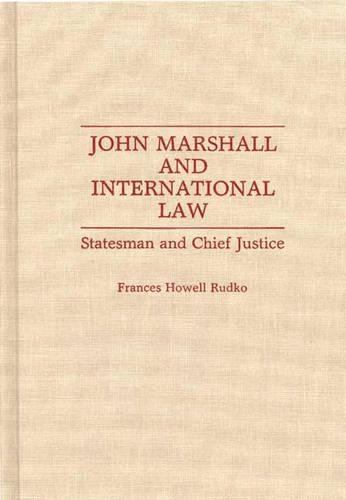
John Marshall and International Law: Statesman and Chief Justice
(Hardback)
Publishing Details
John Marshall and International Law: Statesman and Chief Justice
By (Author) Frances Rudko
Bloomsbury Publishing PLC
Praeger Publishers Inc
30th October 1991
United States
Classifications
Tertiary Education
Non Fiction
347.732634
Physical Properties
Hardback
152
Description
During his thirty-five years as Chief Justice of the Supreme Court, John Marshall wrote the opinions in 80 cases involving international law issues. But unlike other scholars who have claimed that Marshall's education in international law came from these cases, Frances Howell Rudko argues that Marshall was intensively schooled in international law issues in the period between 1793 and 1801. In this work, she explores these crucial years in Marshall's life, and demonstrates that most of the key principles he applied in his international law cases were learned during his pre-Court days. Rudko focuses her study on Marshall's experiences in the eight years prior to his appointment to the Supreme Court, when the events following the Proclamation of Neutrality ushered him into the national political arena. Four episodes from this period are carefully examined and are shown to have provided the foundation for his understanding of international law. They are his appearance before the Supreme Court as debtors' counsel in the case against pre-Revolutionary British creditors; his role in representing the United States in a critical diplomatic mission to France; his time spent in the House of Representatives; and his direction of U.S. foreign policy during his tenure as Secretary of State. These experiences presented Marshall with a daily look at both the realities of international relations and the specifics of international law, and introduced him to many of the issues he would later face as Chief Justice. Students and scholars of American history, the Supreme Court, and political science will find this to be an indispensable work, as will most public, college, and university libraries.
Reviews
Practicing attorney Rudko makes extensive use of primary and secondary sources to show that Marshall had significant practical experience in international law for 20 years prior to his appointment as Chief Justice in 1801. Rudko focuses on Marshall's intellectual and political initiation to the law of nations as an attorney in Virginia litigating claims of British creditors, as a US negotiator in France, and briefly as a Federalist Representative and Secretary of State asserting US neutrality. Marshall early demonstrated a commitment to applying legal principles to politically vital issues of national sovereignty. More complete biographies--A.J. Beveridge's The Life of John Marshall (4v., 1916-19) and F.N. Stites's John Marshall, Defender of the Constitution (CH, Apr '81)--provide less detail about these matters than Rudko's narrowly defined study. At a time of renewed efforts to extend international law against nonconsenting nations, readers will find valuable precendent in Marshall's efforts to persuade US adversaries to respect both treaties and customary rules of law. Rudko's effective use of opinions by Justice Marshall shows both the impact of his foreign policy experience and the early relevance of international law for US courts. Upper-division undergraduates, graduate students, and general readers.-Choice
"Practicing attorney Rudko makes extensive use of primary and secondary sources to show that Marshall had significant practical experience in international law for 20 years prior to his appointment as Chief Justice in 1801. Rudko focuses on Marshall's intellectual and political initiation to the law of nations as an attorney in Virginia litigating claims of British creditors, as a US negotiator in France, and briefly as a Federalist Representative and Secretary of State asserting US neutrality. Marshall early demonstrated a commitment to applying legal principles to politically vital issues of national sovereignty. More complete biographies--A.J. Beveridge's The Life of John Marshall (4v., 1916-19) and F.N. Stites's John Marshall, Defender of the Constitution (CH, Apr '81)--provide less detail about these matters than Rudko's narrowly defined study. At a time of renewed efforts to extend international law against nonconsenting nations, readers will find valuable precendent in Marshall's efforts to persuade US adversaries to respect both treaties and customary rules of law. Rudko's effective use of opinions by Justice Marshall shows both the impact of his foreign policy experience and the early relevance of international law for US courts. Upper-division undergraduates, graduate students, and general readers."-Choice
Author Bio
FRANCES HOWELL RUDKO, an attorney in private practice for eighteen years in Fayetteville, Arkansas, is the author of Truman's Court: A Study in Judicial Restraint (Greenwood Press, 1988).
